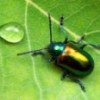If you've been following the Taxonomy Fail and subsequent Myrmecology Win, you'll know that the real Fail was my own. That blurry mash of legs and cuticle is indeed an ant, and I missed it.
That I failed to discern an ant in the original image doesn't bother me. After all, the photo was the equivalent of an amber inkblot, with key bits out of focus, and the paper itself provided no support for the identification. I stand by my comments about the burden of proof lying with the authors- the paper did not adequately justify its conclusions. Partly, this is less the fault of the authors than the publishing model, where top-tier journals increasingly converge on substance-free marketing venues, the details required to properly evaluate the research relegated to online supplements or lesser journals. But that's a topic for another day.
Fortunately for us, Vincent Perrichot, one of the study's authors, was generous enough to share a more detailed image and fill in the missing detail. The specimen turns out to be quite a find. It's as old as the sphecomyrmines, yet it doesn't look like them, or like any modern ants we know. We're in for a real treat when Vincent finishes his more thorough reconstruction of the fossil.
Rather, my more serious failing was the snarky tone I adopted in the original post. That was inappropriate for covering a scientific paper, and I apologize for having crossed the line.

I was stuck working on a handbook chapter all Easter break and missed the brouhaha. Now that I've caught up, I must say that I found it all very informative and entertaining, especially the indignation of one author (I can't count the number of times I've felt like that when reading a review of one of my papers by some supposed 'scientist' colleague!). I'm interested enough now that I will probably read the paper.
Still, I think the original comments were fair enough (if snarky) and the appeals to the authority of the NYT and PNAS poor argument. Both the 'newspaper' (and I say this even though the NYT is the only paper that has ever written up my research in a professional manner - more due to the reporter, than the paper is my guess) and, alas, PNAS derive their authority more from their political power than any scientific merit .
Keep up the skepticism myrmecos, being wrong is integral to science, but easier when you haven't been snarky.
Thanks, Dave. I got off on the wrong foot with that post when I started getting frustrated that the media coverage came out ahead of the actual paper, so that I couldn't get any of the details. That kicked me right into snark-mode.
And that snarkiness begat more snarkiness, but one hopes that that can be overlooked now in the wake of the spirited and utlimately illuminating discussion. It was an enjoyable process to witness and particpate in the resolution of the fossil's identity, even though disturbing to be reminded of the matters of the politics of publication that it brought up.
I think we all gained from it. Keep up the good work!
I have a slightly different view of this. Alex and the rest of us, although snarky, were reasonable in our criticism based on the information available - especially in the contents of the paper. The authors and the journal are at fault for failing to present a coherent argument in the first round, and for getting too defensive over Alex's criticism. Vincent very nicely corrected this problem - and this is indeed a discovery worthy of our excitement. In this way, the blog has acted as a form of "peer review," which is something of great value, and clearly NOT part of the presentation of the information in the paper and press coverage. Unfortunately, the beneficiaries of this peer review are a much smaller audience than that of the audience of PNAS. The authors must contend with this issue, as should the editors, if they are trying to change minds. I have wrestled with this very problem when it comes to my work on exotic ants and I have found it difficult to change minds. The best argument is an abundance of evidence that is accessible to a broad audience. Anyhow, Alex, cheers on having a scientific blog that "works" like one should!
Thanks for all the discussion here... I was traveling when the news about this started to "break" and I only saw the Wired article today. First thought: "What? That doesn't look like an ant! I bet Myrmecos is on this." I wasn't disappointed :)
I think that's pretty close to my view. We were not in the wrong to call out the authors for not substantiating one of their findings. I probably should have done it a bit more tactfully, though.
In your defense, some of it may have been snarkiness (I also felt a pulse of frustration after reading about the paper in Science Daily but being unable to access it) but I think part was also trying to be witty. And while one must consider the targets of one's wit, wit is indispensable to blogging, and allowances must be made for it.